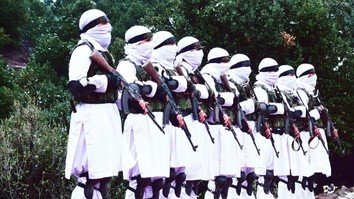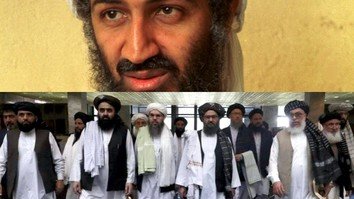KABUL -- Ties between al-Qaeda and the Taliban remain strong, dimming prospects for true peace, say US and Afghan observers.
"Al-Qaeda's links to the Taliban remain strong," said Gen. (ret.) David Petraeus, a former director of the US Central Intelligence Agency (CIA) and former commander of US Central Command, in an op-ed with Vance Serchuk, a senior fellow at the Washington-based Centre for a New American Security.
"As long as the group denies the facts about past acts of terrorism hatched under its aegis, it is impossible to take seriously its assurances about preventing future ones," Petraeus and Vance wrote in the article published November 14 in the Washington Post.
The militant group continues to be unclear about whether it officially accepts that al-Qaeda was behind the September 11, 2001, attacks in the United States.
![An Afghan man reads a newspaper in Kabul on May 3, 2011. It details the death of al-Qaeda leader Osama bin Laden. [Massoud Hossaini/AFP]](/cnmi_st/images/2019/11/20/21012-000_del474963-585_329.jpg)
An Afghan man reads a newspaper in Kabul on May 3, 2011. It details the death of al-Qaeda leader Osama bin Laden. [Massoud Hossaini/AFP]
"Any Taliban deal that requires all US forces to withdraw from Afghanistan should be a nonstarter," the authors argued. "Precisely because the Taliban’s counter-terrorism promises are untrustworthy."
"Americans and Afghans are united in their desire for peace, but a bad deal with the Taliban would be worse than no deal at all -- and from what is known about the accord that was on the table in September, it is likely for the best that [US President Donald] Trump backed away," they said.
Deep ties
"Since the leader of al-Qaeda [the late Osama bin Laden] pledged allegiance to Taliban leader Mullah [Mohammad] Omar, the two groups have had deep ties with one another," said Jawed Kohistani, a military-intelligence affairs analyst in Kabul, referring to the former Taliban chief who died in 2013 and to a commitment that took place sometime in the 1990s.
"Members of al-Qaeda who operate on the border between Afghanistan and Pakistan receive support from the Taliban as in the past," he said.
"The Taliban did not sever their links with al-Qaeda because they have historic ties and a common ideology and political approach," said Kohistani.
"On the other hand, al-Qaeda satisfies the Taliban's financial and weaponry needs to a good extent and trains the group's fighters in arranging terrorist attacks," he added.
"Al-Qaeda and the Taliban consider the United States their common enemy," said Kohistani.
"The Taliban use the experience, tactics and advice of al-Qaeda, an international [terror] network... and this is yet another reason for the Taliban and al-Qaeda's persistent close relations," he said.
Terrorists "are brought to Afghanistan with the help of al-Qaeda agents through al-Qaeda channels via Iran, and they have tried to establish a base, as the one they had in the past, in Afghanistan", said Kohistani.
"The Taliban owe all of their achievements to the al-Qaeda network because Osama bin Laden was able to attract assistance for the Taliban from Islamist movements in Pakistan such as Lashkar-e-Taiba, Lashkar-e-Islam, Lashkar-e-Jhangvi, Nafaz-e-Shariat and others, in addition to that from the Gulf countries," he said.
"Arabs, Chechens, Turkmens, Uzbeks, Tajiks and the rest of al-Qaeda fighters fight against the Afghan security and international forces alongside the Taliban," Kohistani added. "They have a difference in opinion with the Taliban who run peace negotiations in Qatar."
"Al-Qaeda is building relations with Russia so that they can protect themselves using that country's intelligence," he added.
Partners
"Taliban leader Mullah Omar accepted the collapse of his government but didn't break relations with al-Qaeda," said Mirza Muhammad Yarmand, a former deputy interior minister.
"Ties between the two groups are stronger and deeper than we think, and the Taliban consider al-Qaeda their partners in achievements."
"The Taliban and al-Qaeda have shared nterests, enemies and ideology as well as shared historic, military and blood relations," said Helali, a political and military affairs analyst.
"Al-Qaeda has been the Taliban's supporters on the battlefields for at least 25 years, and during the war with the Northern Alliance, the Taliban fought on one front and al-Qaeda fought on the other front against the Northern Alliance. They [together] later fought against the international forces and Afghan security forces. This is why the Taliban try hard to preserve these relations," he said.
"As the government and people of Afghanistan need the international community's support, the Taliban need al-Qaeda, and this relationship can last for many years," he said.
"Al-Qaeda brainwashes Taliban fighters, transforms their views, prepares them mentally for war, preaches religious propaganda to urge jihad and gives them guidance," said Toryalai Ghayasi, an international affairs analyst in Kabul.
"They also provide the Taliban financial and military assistance, and this is the reason the Taliban don't want to cut their links with al-Qaeda," Ghayasi added.
"The Taliban hide their links with al-Qaeda because they don't want their secrets to be disclosed, which can spoil their negotiations with the United States," said Ghayasi.
"Al-Qaeda's relations and assistance helped the Taliban to return to the battlefield and capture a part of the country after they were toppled by the coalition forces," said Gen. (ret.) Sikander Asghari, former deputy of the General Directorate of Local Police and a military affairs analyst.
"Al-Qaeda and the Taliban try to keep their relations secret, but these ties are sometimes unintentionally disclosed -- like when one of the al-Qaeda leaders was killed in Helmand," said Asghari.
"Members of al-Qaeda operate in the Taliban's uniforms and under their flag so their identity can't be revealed," he added.

![Gen. (ret.) David Petraeus participates in a discussion with Peter Bergen, vice-president of the think-tank New America, in New York June 20, 2016. Petraeus pointed out al-Qaeda and the Taliban's continuing ties in a November 14 op-ed piece. [Bryan R. Smith/AFP]](/cnmi_st/images/2019/11/20/21016-pak1-585_329.jpg)






